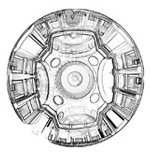
Is Religious Belief a Type of Knowledge?
ON THE PRESUMPTION OF NATURE’S INTELLIGIBILITY
Nor do I seek to understand that I may believe, but I believe that I may understand. For this, too, I believe, that, unless I first believe, I shall not understand. — St. Anselm
In our time, we have grown accustomed to thinking that religious claims, which we call “beliefs,” are the opposite of knowledge. In a game of free association, no one would likely respond to the word knowledge by saying “faith” or “belief.” They would more likely say “science,” “fact,” or “evidence.” We’re more likely to regard belief as an antonym for knowledge, and this is why many people regard religion and science as competitors and sometimes even enemies.
This attitude is a notable feature of what is often called modernism, a term that describes various cultural patterns that have developed over the past four centuries, that is, the modern or Enlightenment period. During this time (roughly 1600 to the present), people have become more literate, more secular, and more dependent on technology, urban ways of life, and science as a knowledge resource.
The growth of scientific understanding is the most impressive development that has occurred over these four centuries. Science has given the impression of making all things knowable, and with this comes the opposite notion that perhaps all things merely believed are expendable — religious beliefs in particular. If scientists can know things with certainty, why bother with things that are only speculative? The problem with this assumption is that it is a practical impossibility. There is no belief-independent knowledge, and in the following pages I will explain why this is so.
You May Also Enjoy
Ed. Note: During the 1985-1986 academic year, Henri J.M. Nouwen was a priest-in-residence at the…
We mistakenly took 'aggiornamento' to mean we must 'catch up with the modern world," instead of its true meaning: the transformation of the world, not the Church.
Why would Pope Francis form a group to study the composition of the 1968 encyclical if the intent is not to fundamentally change its message?

